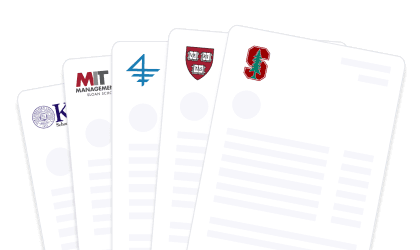
Join a free event
Learn from top coaches and industry experts in live, interactive sessions you can join for free.
Table of Contents
Starting your college essay can feel like the hardest part of the whole application. I’ve worked with students who had great ideas but got stuck on the first sentence. That hesitation is common, and it matters. The first few lines of your personal essay are where you earn attention from college admissions officers, the admissions committee responsible for evaluating your application and looking for authenticity in your story. If your opening works, they keep reading. If it doesn’t, your strongest accomplishments might never get seen the way they should. This article will provide you with practical college essay tips to help you make a strong first impression.
After years of working with students applying to competitive schools like Stanford University, Harvard University, and many others, I’ve seen what makes an essay stand out. In this article, I’ll break down five expert-backed strategies that show you how to start a college essay that actually works. These tips apply whether you’re writing your personal statement, tackling supplemental essays, or trying to answer common app essay prompts in your authentic voice. Throughout the article, I’ll also reference essay examples to illustrate key points and help you understand what works.
1. Start With a Real Story From Your Life
Why Stories Work Better Than Lists
College admissions officers are not asking for a list of awards. They already have that information. They’re asking for a personal essay because they want to understand who you are beyond test scores and GPA. A real story from your life, especially one tied to personal growth, helps your essay stand out.
When I help students choose a story, we talk about how even small moments can carry meaning. One student wrote about learning to swim later than everyone else. Another wrote about helping their host family cook during a community service trip. Both essays were memorable because they focused on personal change and reflection, not just accomplishments. Describing these moments in vivid detail allows the reader to connect emotionally with your story and better understand your journey.
If you’re wondering how to start a college essay, begin with one story that shows what matters to you. Your goal is to make admissions committees feel like they’re learning something new about you, not just reading another student’s résumé.
How to Find Your Story
Start by thinking about specific life experiences where something shifted:
- A moment in middle school that shaped how you see the world
- A conversation with an older brother, coach, or teacher that challenged you
- A failure that taught you more than a win ever could
- A family tradition that showed you what matters
- A turning point from freshman year or the past summer
- A time during community service, volunteer work, or public speaking that changed your confidence
Expert Tip: Write a list. Don’t overthink it. Then pick one experience and build the essay around it.
Read: How to End a College Essay (With Examples)
2. Use an Attention-Grabbing Hook (But Don’t Try Too Hard)
What Makes a Good Hook?
The first few sentences of your essay need to make someone stop and want to keep reading. That’s your hook. But it doesn’t need to be dramatic or clever. It just needs to be specific, clear, and true to your own voice. A good hook shows the reader something real, instead of telling them what to think. Here are common types of hooks that have worked in the best college essays:
| Hook Type | Example Opening Line | Why It Works |
|---|---|---|
| The Confession | "I have been pooped on by pigeons, hawks, and possums. More than once." | Vulnerable, specific, and unexpected. |
| The Shocking Image | "Smeared blood, shredded feathers. Clearly, the bird was dead." | Vivid image that makes readers ask questions. |
| The Mini Hemingway | "Every Saturday morning, I’d awaken to the smell of garlic and red pepper." | Sensory detail that builds character. |
| The Twist | "I was the captain of every team I played on. But that was only me on the surface." | Reverses expectations, shows complexity. |
| The Trailer Thesis | "This desk I sit at has not only seen me through the last six years..." | Gives structure without giving away the whole story. |
Note: You don’t need to force a perfect line. But you do need to avoid generic statements like “Since the dawn of human existence…” or “I’ve always wanted to attend my dream school…” These don’t say anything personal, and they don’t help your essay stand.
3. Show, Don’t Tell
Build Scenes Instead of Summaries
The strongest essays use scenes, short, specific moments, to show who you are. When students tell me their personal essay feels flat, it’s usually because they’re summarizing instead of showing.
Let’s say you want to write about leadership. You could say:
“I learned to be a strong leader through my role as student council president.”
Or you could show it:
“I walked into the cafeteria with a clipboard and a knot in my stomach, ready to ask 200 students to switch lunch schedules for a fundraiser that wasn’t even fully planned.”
Use the Right Tone
Admissions officers read thousands of college essays. Most of them use language that’s either too formal or too casual. Your tone should sound like you, but a polished version of you. That means avoiding overused phrases, complicated words, and writing that sounds like it came from a textbook. It also means avoiding sarcasm or jokes that only make sense to your best friend. Use clear sentences, short paragraphs, and an authentic voice. If you’re not sure what that sounds like, try reading your essay aloud.
4. Don’t Give Everything Away Too Soon
Why It Helps to Hold Back
Some students try to explain the whole point of their essay in the first paragraph. But a strong essay builds toward meaning. If you tell the reader your conclusion up front, there’s nothing left to discover. Think of it like this: Would you keep watching a movie if the first line was “This is the story of how I learned to never give up”? Probably not. That’s the same effect a too-obvious thesis has in a college essay. Instead, use your opening to set the scene and hint at what’s coming. One sentence can create interest without giving away the full message.
The Trailer Thesis
One example is what some coaches call a “trailer thesis.” It’s a line at the end of your first paragraph that signals what the essay will explore, without revealing everything.
“This desk I sit at has not only seen me through the last six years, but its story reflects how I think.”
5. Write Early, Edit Often, Read Aloud
Start Writing Long Before Senior Year
The best college essays rarely come from a first draft. I’ve worked with students who wrote five, ten, even fifteen drafts before the version that helped them get into their dream school. If you’re serious about your personal statement or supplemental essays, give yourself time. The best time to start writing is during the past summer before senior year. When school and other students’ schedules get busy, it’s harder to write with focus. Start early. Write freely. Don’t worry about word count in the beginning. You’ll cut and shape it later.
Use Feedback From People You Trust
Once you have a draft you’re ready to share, get feedback from people who know your writing and care about your goals. That could be:
- A teacher
- A college essay coach
- A parent or guardian
- A best friend
- A sibling
- A mentor
Read your essay aloud to them. Reading aloud helps you catch awkward lines, sentences that don’t sound like you, and moments that need more context. Ask your readers what they understood. Where did they feel confused? What stood out most? Then revise based on their constructive criticism, without letting other voices take over your essay.
For a full guide on writing essays for college, read:
- How to Write an Amazing College Essay: 3 Tips for Success
- Writing the College Essay: Dumplings, Dogs, the Letter S, and the 5-Step Process That Makes Sense of All the BS
The Bottom Line
If you’re stuck wondering how to start a college essay, focus less on getting it perfect and more on getting it personal. The best college essays begin with a real story, something specific from your student’s life that shows growth, values, or personality. A great college essay can make a lasting impression on the admissions committee by authentically showcasing who you are. The strongest openings use a clear hook that gets to the point without trying too hard. The rest of the essay builds around that opening, using scene-based storytelling and an authentic voice that reflects the writer’s perspective.
Start early. Read your essay aloud. Ask for feedback from people you trust, whether it’s a teacher, parent, coach, or friend. And don’t worry if your story seems small. What matters most is how you tell it. A strong essay doesn’t try to impress. It connects. That’s what admissions officers remember. Great essays can impact the lives of both the writer and the reader, leaving a meaningful and memorable effect. Remember that tailoring your essay to a particular university is crucial. Showing why you are a great fit and expressing genuine interest in that school can make your application stand out.
Work With an Essay Coach to Strengthen Your Essay
Starting a college application can be stressful, especially when you know your personal statement carries more weight than ever. With many schools reducing the role of test scores, admissions officers are looking even more closely at writing.
Leland’s expert essay coaches have helped students get into Stanford University, Harvard University, and other top colleges. If you want help turning your life experiences into a strong essay that makes a lasting impression, explore our admissions coaching today.
Read these next:
- 4 Tips to Elevate Your College Essay
- How to Write a Conclusion for a College Application Essay
- What Looks Good on College Applications? 6 Tips to Make Your Application Stand Out
- 5 Tips for Time Management in College
- Top Questions to Ask a College Admissions Officer
- The 10 Best College Admissions Consultants
FAQs: How to Start a College Essay
How to start a college essay?
- Begin your essay with a sentence or short paragraph that captures attention right away. Use a bold statement, a specific scene, or a personal moment. Avoid vague generalizations. A clear opening helps readers understand your story and keeps admissions officers interested from the start.
How to start a college essay introduction?
- Start your college essay introduction with a sentence that puts the reader in a real moment from your life. It could be a short scene, a surprising fact, or a clear statement that shows your personality. Avoid general statements or quotes from other people. Use your own voice to begin with something specific and meaningful. Your introduction should lead naturally into the rest of your personal essay.
How do I begin to write my college essay?
- Start by thinking about a life experience that changed how you see something. Write down a list of small turning points from high school, middle school, or the past summer. Pick one story that reflects your personal growth, and start writing from that moment. Don’t worry about length or structure at first. Focus on telling the story clearly. You can revise later.
What is a good sentence to start a college essay?
- A good first sentence grabs attention without trying to sound impressive. It should be personal, direct, and specific to your own story. For example: “I walked into the kitchen to find my host family crying around the radio.”
What is the first sentence of a college essay?
- The first sentence of your college essay sets the tone for the entire application. Use it to introduce a scene, moment, or reflection that matters to you. Don’t use a broad generalization or a quote from someone else. Great college essays begin with the student’s own words and voice. Keep it simple, honest, and clear.
Browse hundreds of expert coaches
Leland coaches have helped thousands of people achieve their goals. A dedicated mentor can make all the difference.


























